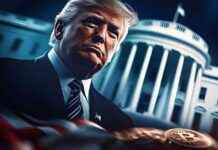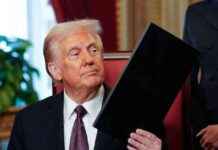Summary:
CryptoQuant CEO Ki Young Ju warns of the United States using cryptocurrency as a geopolitical tool, following President Trump’s announcement of a U.S. crypto reserve. Ju believes that the U.S. is shaping the crypto market without proper regulations, potentially affecting the neutrality of Bitcoin and Ethereum. These changes could lead other nations to tighten crypto regulations in response.
The Role of the United States in Shaping the Crypto Market
The world of cryptocurrency is undergoing a significant transformation, with the United States taking center stage in shaping its future. According to CryptoQuant CEO Ki Young Ju, recent developments indicate that cryptocurrency is being leveraged as a tool to advance U.S. interests on the global stage. Ju’s concerns stem from President Trump’s announcement regarding the creation of a U.S. crypto reserve, which includes popular digital assets like XRP, SOL, and ADA.
In a candid statement on his official X account, Ju expressed his belief that the crypto market is gradually evolving into a “weapon of the United States.” He highlighted the impact of political decisions made during Trump’s presidency, suggesting that business ethics in the sector have deteriorated under the current administration’s influence. Ju pointed out that activities previously deemed illegal may now be sanctioned if they align with Trump’s agenda and serve U.S. national interests.
One of the key issues raised by Ju is the lack of essential regulatory frameworks governing the U.S. crypto market. This regulatory vacuum has created a breeding ground for risky practices such as “rug pulls” and fraudulent schemes, which continue to thrive unchecked. Moreover, projects aligned with the Trump administration’s priorities enjoy preferential treatment, while others face obstacles in navigating the evolving landscape. Ju’s observations underscore a concerning trend where the U.S. government’s influence is reshaping the dynamics of the crypto industry.
The Implications for Bitcoin and Ethereum Amid Shifting Policies
The ramifications of the U.S.’s evolving stance on cryptocurrency extend beyond domestic borders, affecting major digital assets like Bitcoin and Ethereum. These foundational cryptocurrencies have long prided themselves on their independence and global accessibility, operating as decentralized networks free from political entanglements. However, Ju’s analysis suggests that the recent policy shifts initiated by Trump could jeopardize their neutrality.
Ju highlights the challenge faced by Bitcoin and Ethereum in maintaining their autonomy amid the U.S.’s strategic maneuvers in the crypto space. The emergence of a more interventionist approach to crypto regulation raises concerns about the long-term viability of these networks. Should the U.S. continue to prioritize its national interests in shaping crypto policies, it may prompt other countries to follow suit by imposing stricter regulations on digital assets.
As investors and traders grapple with these uncertain developments, the crypto market faces a period of transition where adaptability and vigilance are paramount. The potential for geopolitical influences to shape the trajectory of digital currencies underscores the need for a balanced regulatory framework that safeguards the integrity of the industry while fostering innovation and growth.
In conclusion, the intersection of politics and cryptocurrency presents a complex landscape where the actions of a single nation can reverberate across global markets. CryptoQuant CEO Ki Young Ju’s warnings serve as a timely reminder of the evolving dynamics within the crypto sphere and the imperative for stakeholders to navigate these challenges with foresight and resilience.




















